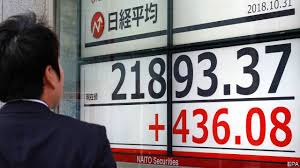Japan’s stockmarket is poised for a comeback

THE BIG hair, shoulder pads, splashy videos and tinny recordings were hard to escape at the time. But where are the pop stars of the 1980s now? At an arena near you, most probably. Though the waists are thicker and the hair is thinner, the singers and their songs are recognisably the same. In their own minds, they are still big stars. It was the music business that got small.
No sub-genre of pop is so lamentable that it cannot be resold to the nostalgic. Might such marketing magic also be applied to Japan’s stockmarket? In the 1980s asset prices in Japan reached a level of excess that made the cocaine-addled pop stars of the era seem like choirboys. By 1990 the Nikkei index of stocks was trading at 60 times company earnings. Then came the fall. But after a long time in rehab, Japanese stocks are creeping back into the spotlight.
Like other mooted revivals, this one attracts plenty of scorn. Repeated attempts to call the bottom of the Japanese market have made fools of foreign investors. Japanese companies are not known for making shareholder returns a priority. And why invest in a country with an ageing and shrinking workforce? For these and other reasons, big global funds have been underweight Japan. But who can resist a comeback story? For the first time in years, Japanese companies are playing a tune that investors are able to whistle.
The key change is that listed firms in Japan are using shareholder funds more effectively. As a new report from analysts at Morgan Stanley points out, return on equity (RoE) has lagged well behind global standards for most of the past three decades. But since 2012 the gap has narrowed. Japan’s RoE has doubled, to 9.8% (see chart). Much of the improvement can be traced to cuts in corporate taxes and a reduction in debt-servicing costs because of lower interest rates. But it is also down to better control of costs and the sweating of corporate assets.
A healthier economy has helped, too. Deflation has ended. Nominal GDP has been growing steadily. And the job market is buoyant. Unemployment has fallen to 2.3%. The ratio of vacancies to jobseekers is the highest since the early 1970s. More women than ever are in the workforce—the female participation rate is higher than in America and above average for the OECD. Output per hour has recently grown faster in Japan than in any other G7 country, according to the Conference Board, a research group.
Less noticed, perhaps, are changes at the company level. Corporate Japan remains a cosy place; the custom of cross-shareholdings, in which companies own equity stakes in each other, created a core of friendly stockholders who don’t rock the boat. But a recent spate of governance reforms has shaken things up a bit. The vast majority of companies now have at least two independent directors. There are more female board members. And firms are less likely now to schedule their shareholder meetings on the same day as each other—a tactic to deter awkward questions for managers.
All this is encouraging. But it is easier to change Japan’s corporate culture than its demography. Investors wonder why they should put money into a country with fewer and fewer customers. The answer is that the market for Tokyo-listed firms is not confined to Japan. A survey commissioned by the Morgan Stanley analysts found that expanding into foreign markets was the primary strategic focus of Japanese firms. (Improving productivity was second.)
The firms themselves are investing. Private-sector capital spending has risen for seven consecutive quarters for the first time since the 1980s. In an economy with a shortage of labour, people are more likely to be open to automation. Japanese firms already hold sway in key parts of the robotics industry. Increased automation will help Japan close the RoE gap with its peers by 2025, says Morgan Stanley. A higher premium on Japanese stocks would then be warranted.
Reaching that target would depend on Japan sticking with “Abenomics”, the expansionist policies of the prime minister, Shinzo Abe. It would also require buy-in from global fund managers. They are used to thinking of China and other emerging markets as the alternatives to investing in America, passing over Japan and Europe as has-beens.
But fashions change, in investing as in popular culture. Time in the wilderness can be used to great effect. In order to have a comeback you must first have a setback—a wise observation by that icon of 1980s popular culture, Mr T.
This article appeared in the Finance and economics section of the print edition under the headline “Sunrise in Tokyo”





